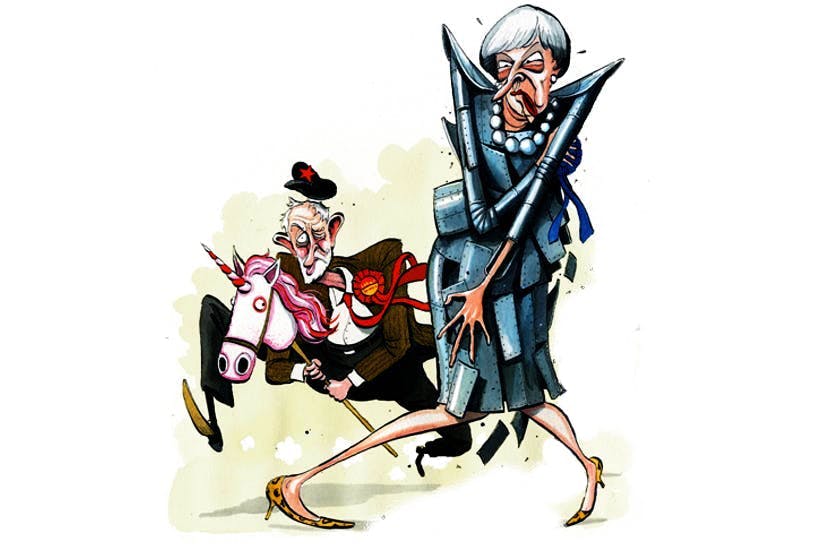One could almost look on Theresa May and Jeremy Corbyn and see a story of frustrated love. They could be happy, the soppy observer might think. If only they could get some time on their own, and unburden their hearts, they would find they were in perfect agreement. Alas, their inability to be honest with each other keeps them apart, and prevents them knowing their true feelings.
Brexit is not a romance but a national tragedy. But in one respect at least it matches stories of unrequited love. Brexit is being defined by the inability of political leaders and much of the media to be honest with themselves – and indeed anyone else. The result is the greatest outbreak of political lying of my lifetime. You can compare it with Suez, but at least in 1956, Hugh Gaitskell and the Labour opposition clearly stated that Eden’s pretext for invading Egypt was false. Now government and opposition compete to see who can tell the greater lies.
Take the Prime Minister. She and Corbyn agree that on no account should the public be allowed a second referendum. She must also agree with Corbyn that Britain should stay in the Customs Union. Her withdrawal agreement’s stipulation against the return of a hard border in Ireland demands nothing less.
I know that the Tory right has spent months advocating sci-fi solutions, and the fact that its leaders have been able to get away with peddling fantasy is further proof, if further proof is needed, of our political decadence. But if the British have learned anything in the past three years, it should be that the EU does not betray its members. It will not sacrifice Ireland to please Britain. Without a guarantee to protect the Good Friday Agreement, there will be no withdrawal agreement, and without a withdrawal agreement there will be no deal. No deal, in any circumstances.
The Tory right claims that even if we crash out, we can still negotiate a Canada or super-Canada deal. But as Michel Barnier says:
‘We would not discuss anything with the UK until there is an agreement for Ireland and Northern Ireland, as well as for citizens’ rights and the financial settlement.’
A right that can’t accept the obvious may have retreated into a bunker with walls so thick no inconvenient truth can penetrate them. When TS Eliot said ‘humankind cannot bear vey much reality,’ he might have speaking of today’s Tories. Or perhaps, despite everything we have been through, it still clings to the fantasy that Great Britain is so important, so damn GREAT, that other countries will have to bow to our wishes, however loudly they protest today they have no intention of doing anything of the sort.
Whatever the reason, May and the government machine ought to be leveling with the public and shooting down this and every other piece of Brexiteer propaganda. The Prime Minister cannot because, in a manner which would be satisfying if the consequences for Britain were not so grave, she has been undone by her own spin. Having failed to build a consensus, having pandered to the most bovine right-wingers with her cries of ‘no deal is better than a bad deal,’ she cannot lay out a truthful account of Britain’s position and the consequences of her own policy.
Notoriously, she can no longer speak for her own divided party, whose grassroots are transforming into a Trumpian collection of know-nothing nationalists, and whose MPs are split so deeply they can no longer work together. Even if she could tell the truth, you wonder who would listen. Is she sincere in wanting a deal with Corbyn, considering they agree on so much? Or is she trying to use the threat of a cross-party alliance to push right-wingers and northern Labour MPs into supporting her?
Posing May’s deal and no deal as opposites neglects the obvious point that May’s deal is a very hard Brexit indeed. That Corbyn has failed so miserably to oppose it, that he has abandoned membership of the single market, freedom of movement, and treated demands for a second referendum with two-faced equivocation, reminds us of an old lesson that had almost been forgotten: the far left can be extraordinarily right wing.
For how else to describe a policy that leaves the poorer regions of Britain poorer, and imposes the most severe loss of rights to work and to live where we want that the British have seen since World War Two; and then adds the toughest controls on immigration, any Labour leader, including all those alleged ‘sellouts’ Corbyn wasted his life denouncing, has supported.
Is this still official Labour policy? I only ask because in the indicative votes Labour backed a second referendum and single market membership as well as a customs union. But Corbyn has not publicly argued for either and the votes look like just another tactic to embarrass the Tories rather than an honest attempt to solve the crisis. Meanwhile his allies from the Stalinist wing of the far left have given up any pretense that they are distinct from the nationalist right.
Like the Tory nostalgics, they too believe Great Britain’s greatnesses is unquestionable, except in the case of the nationalist far left they think Brexit will lead to socialism in one country rather than Empire 2.0. After one of their leading figures said Brexit’s opponents were ‘rootless cosmopolitans’ – the very phrase Stalin used to describe Jews, the connoisseurs of national Bolshevism among you will have noticed – and left-wing leave campaigners were revealed to have been in receipt of Arron Banks’s lucre, the black Labour MP Clive Lewis wrote well of a mental world where the working class was always white, and the far right was not always an enemy. There was, he said:
‘A romantic notion of the white working class with little regard for “liberal” intersectional-class politics. Let me tell you something as a black man here in the UK. There’s a reason most of us voted against Brexit and continue to do so. Brexit isn’t going well for us. Isn’t going to go well for us. Racism and intolerance and the rise of the far right puts us on edge shall we say.’
No one looking at Corbyn’s history of associations with the Communist Party of Britain and Socialist Workers Party or at his opposition to Europe can have many doubts which side of the dispute he would take, if he were still on the backbenches. But once again, Corbyn is not honest. He has never made a principled speech as leader explaining his opposition to the EU, anymore than May has made an honest speech exposing the make-believe world of the Brexit right.
My best guess is the Labour leadership wants disaster socialism not a compromise solution, to let the chaos deepen so that it might force an election Labour can win. Even if I am wrong, and a deal is reached, Corbyn can no more control Labour MPs than May can control Tory MPs. So where their talks will leave Britain is anyone’s guess.
For two decades it has been commonplace to diminish politicians. Globalization and the web are meant to have made them irrelevant. But no country can survive without leaders who will, if only on occasion, level with their electorates. As Brexit Britain is learning to its cost.
This article was originally published onThe Spectator’s UK website.

























